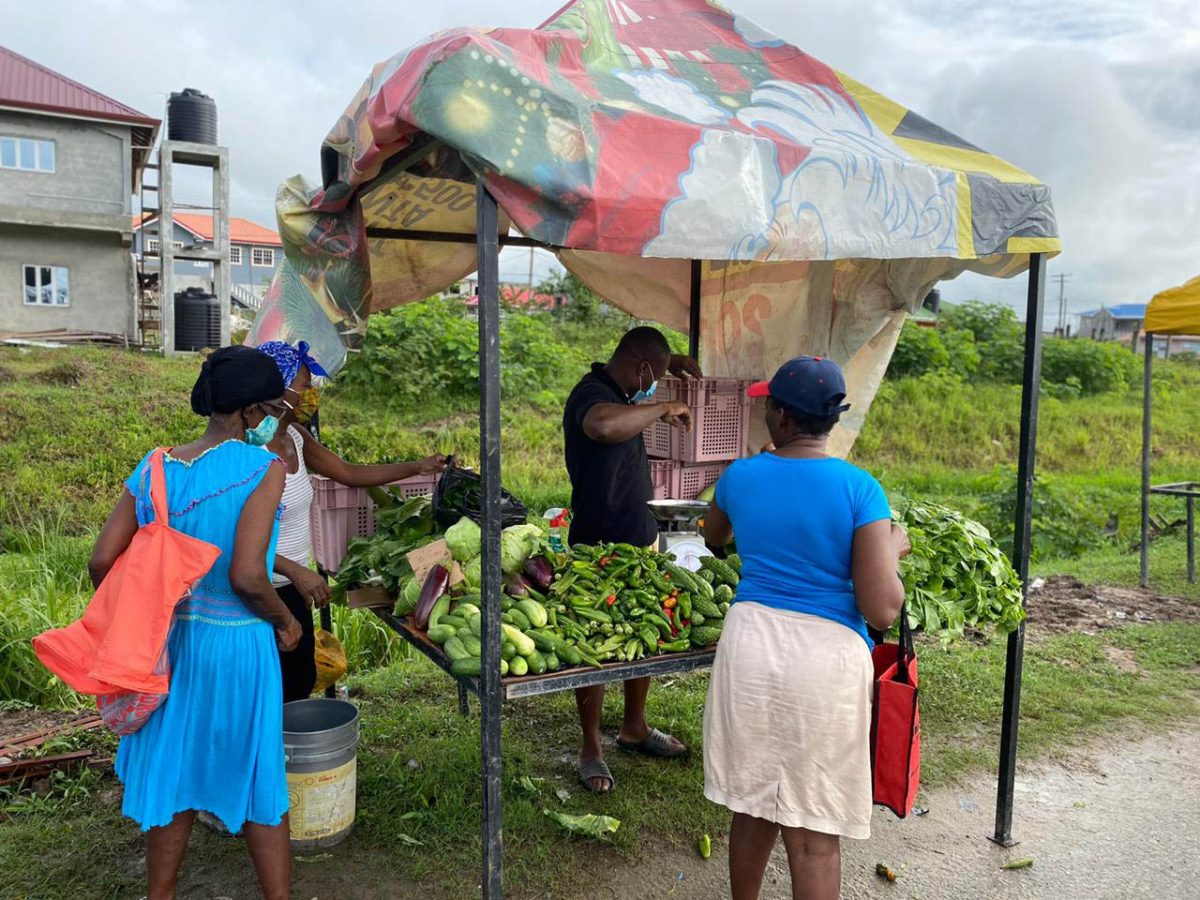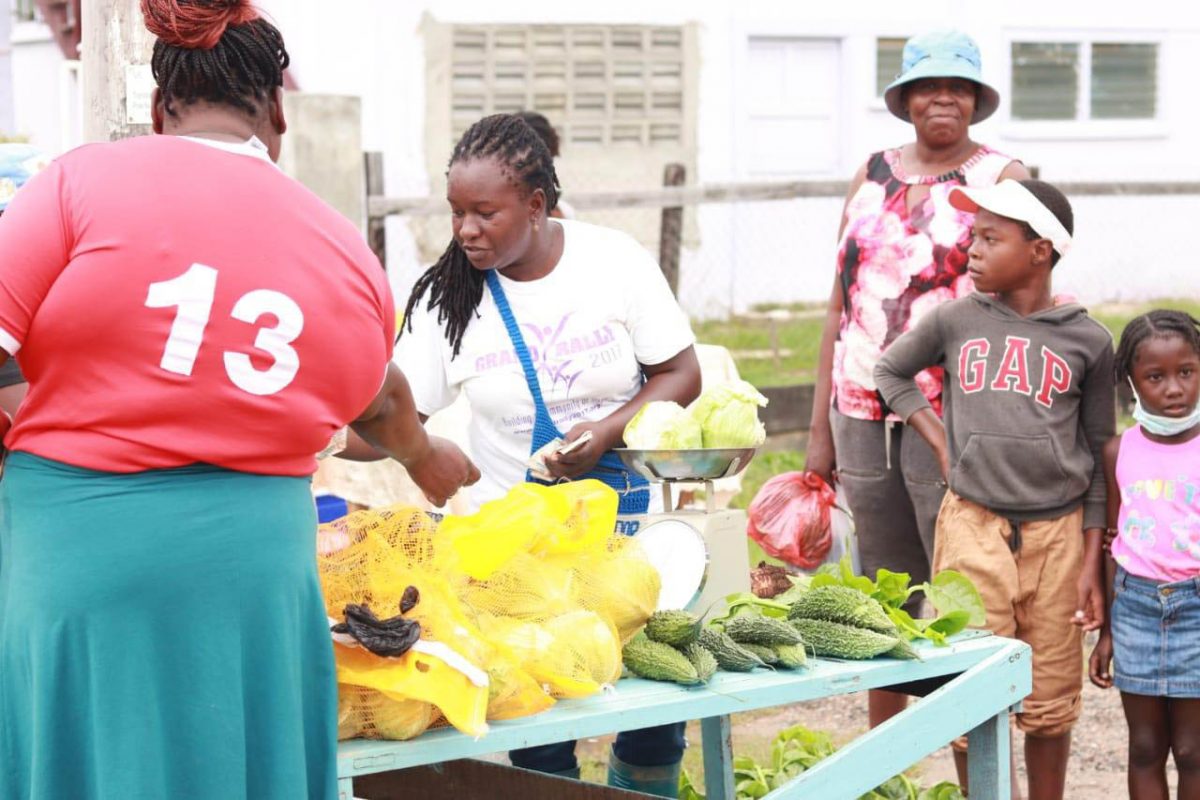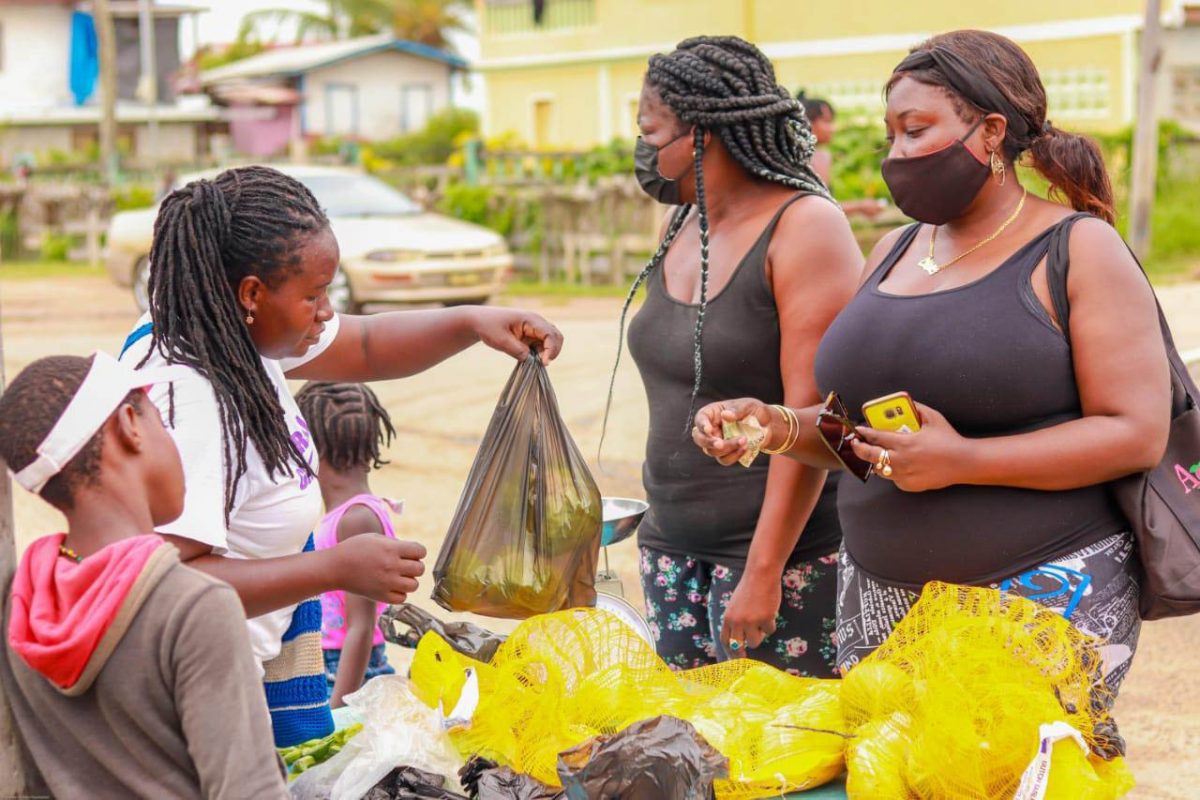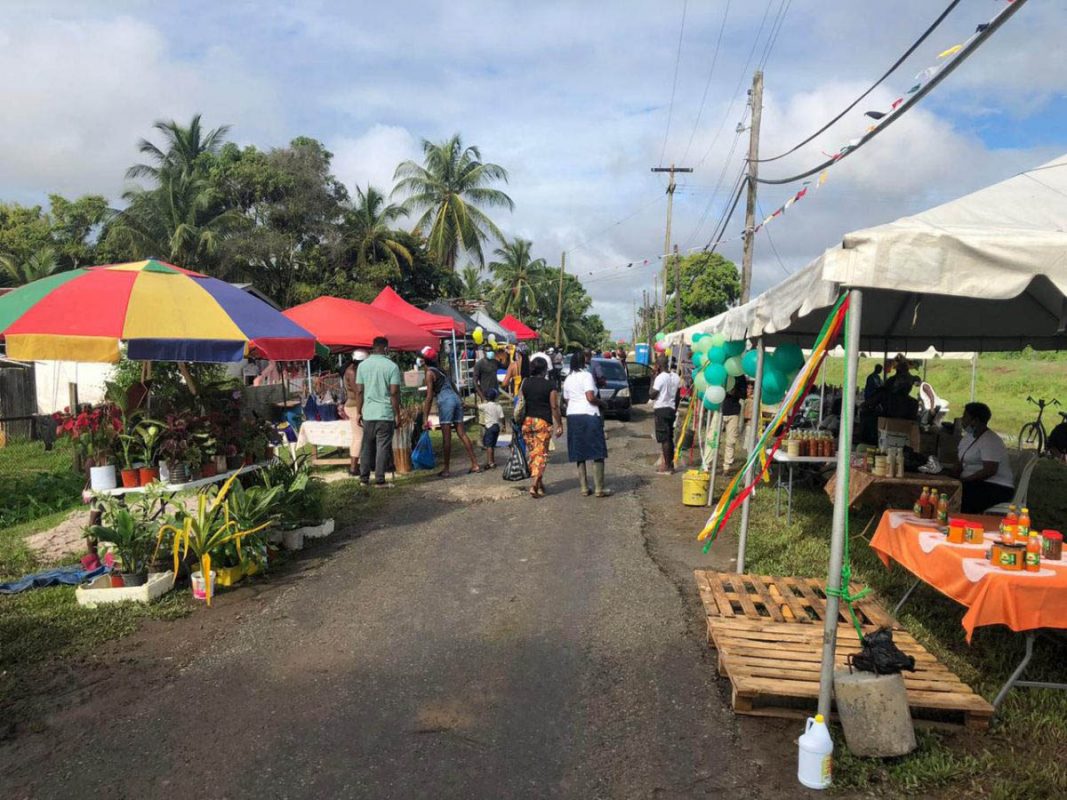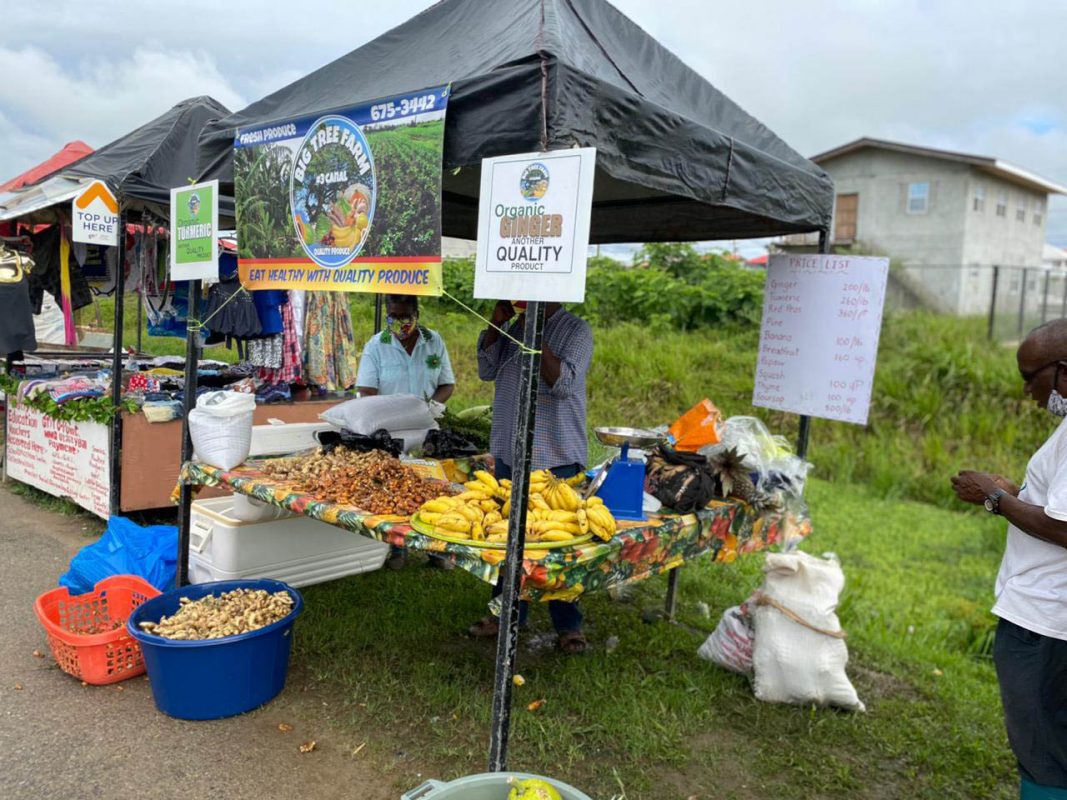Even as the business sector continues to worry over the erratic economic climate that has persisted for more than a year now on account of the COVID-19 pandemic, the will to survive and, where possible, even to realise a modicum of growth is still evident in the outlook of small farmers and agro-processors across the country.
Since the beginning of 2021 the Stabroek Business has covered at least four Farmers Markets in rural communities where the participants sometimes appear to be perched on the edge of the protocols put in place in an effort to halt the march of COVID-19.
Back in February this newspaper covered a Farmers Market at Mocha, largely a community affair, where farmers cultivating crops and tending cattle in the backlands of Mocha turned out in impressive numbers to offer their produce, meats, and an assortment of fruit and vegetables to residents of their own community and to neighbouring ones.
The event seemed to break the monotony of the early Sunday morning quiet of a village known for its late night entertainment. More importantly, the organisers – a community cooperative – appeared to have gone to considerable mindfulness of the protocols associated with the rampaging coronavirus.
Nor has Mocha, by any means, been the exception to what, over the past year, had been a surfeit of Farmers’ Markets, at Linden in Region Ten, Fryrish, Corentyne in Region Six, and No. 28 Village, Belladrum and Hopetown in Region Five, among others.
Everywhere, we discovered that the farmers appeared to be making a twofold case for the popularisation of the Markets. First, they pointed out, Farmers Markets were playing an important role in helping to respond to loss of full-time jobs occasioned by employers’ responses to the advent of the coronavirus. Secondly, the Markets were serving, as well, to help create a measure of food security at a time when the pandemic had, to a greater or lesser extent, given rise to some measure of food security concerns.
Other issues emerged too. In Mocha, for example, the organisers of the Farmers Market were evidently seeking to use the occasion to mount their own aggressive lobby for interventions at the levels of both the local and central government authorities to ‘chip in’ urgently, to support initiatives like additional land clearing, upgraded drainage and irrigation and the creation of all-weather access roads to the farms. Further, with an eye to the consolidation of the services that they offer, the farmers in Mocha raised issues that included the creation of a sheltered facility where their markets could be held, as well as support in acquiring cold-storage equipment for perishables.
On successive Wednesdays, May 5 and 12, the Stabroek Business was there to witness two stagings of Farmers’ Markets in Region Six by the Gibraltar/Fyrish Farmers’ Association. The first of these focussed on the sale of vegetables; the second on the sale of meats.
Neville Bourne, the Association’s Secretary, told the Stabroek Business that Farmers’ Markets had been used since 2017 to help build bridges amongst the neighbouring communities and that these events had manifestly proven their importance particularly at a time when the COVID-19 pandemic had given rise to job losses.
Bourne said that while the relatively small number of farmer/vendors – nine in number – made the event appear like a modest one, its significance should be measured in terms of the role which it played in providing residents with a measure of assurance at this time.
In both instances the Region Five Farmers’ Markets commenced at 10:00 hours and concluded at 16:00 hours.
Bourne said that buyers – residents of the nearby communities between Fryrish and Gibraltar – all appeared to be satisfied with the selection of farm produce that had been made available by the farmers including a range of seasonings, vegetables, bottled coconut water, pepper sauces, as well as beef and chicken.
Bourne, a teacher by profession, and formerly Head Teacher of the Gibraltar/Courtland Primary School, served as a Trustee of the Association at the time of its establishment in 2016. Chairperson of the Association, Andora Ford, herself a farmer, told Stabroek Business that the organisation has at its disposal around 800 acres of land aback of the Gibraltar, Courtland, and Fryrish villages. Revenues accrue to the Association from a contract which it has enjoyed with the National Drainage and Irrigation Authority (NDIA) to maintain approximately fourteen drainage and irrigation canals. The last contract having now expired, the Association is keenly awaiting renewal.
Many of the farmers comprising the group are serving and past seasonal workers with the sugar industry. Food crop farming has long been a crucial income-earning subsidy in what are essentially poor communities.
Ford also disclosed that in order to expand the range of agricultural pursuits of the Association it had successfully lobbied for the acquisition of an area of land to serve as pasture for cattle owned by farmers in the Gibraltar/Fryrish area.
The efforts of the Association, to use the Farmers’ Markets to realise a greater measure of self-reliance for the community does not however, stop there. Ford disclosed that the group is currently engaged in discussions which it hopes will lead to the creation of income-generating fishing and tourism facilities in the Gibraltar area. Accordingly, the Association is already hoping for both state and private sector support to assist in the establishment of an income-generating facility.
Some measure of support, in terms of training for farmers, has already been forthcoming from the National Agricultural Research & Extension Institute (NAREI), Ford says. Particularly, NAREI has been providing support designed to assist farmers in their cultivation pursuits utilising significantly reduced amounts of chemical-based fertilisers.
As a vegetable farmer in her own right, Andora told Stabroek Business that she is currently engrossed in diversification that will her take fully into agro-processing. She has already taken steps in that direction, manufacturing pepper sauce, blended seasoning and coconut water.
Seemingly encouraged by the level of community participation in the two recent Farmers’ Markets, Ford told Stabroek Business that the Association is now considering the staging of such events fortnightly, beginning in June. This, she says, will allow farmers to have more products available for sale.
The focus of the Farmers’ Markets, she says, is twofold. First, the Association is seeking to create viable entrepreneurial options for those of its members whose earnings might have been affected by loss of jobs and who, otherwise, might feel the need for enhanced financial security in the prevailing climate. No less important, she says, the Association considers it to be part of its mission to seek to allay such food security concerns as might arise in the communities from which it draws its membership.
